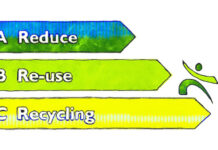New sustainable fiber-based packaging and innovative reuse, or re-use, schemes are the focus of the R3PACK(Reduce, Reuse, Rethink PACKaging) research project co-funded by the Horizon Europe program. (1)
1) Food packaging and plastics. Foreword
Packaging waste accounts for 36 percent of municipal solid waste in the EU, as well as 61 percent of post-consumer plastic waste collected through relevant streams. (2) And plastic is at the same time:
- the most commonly used type of materials to package food products sold at retail in the EU (37 percent of the total),
- the material with the drastically lowest recycling rate compared to others. 41 percent the EU average, 46 percent in Italy (2.3),
- A growing source of greenhouse gas emissions, estimated to account for 15 percent of the total by 2050, (4)
- a primary cause of microplastic and toxic chemical pollution in the atmosphere and waters, including those in Italy’s large watersheds. So in foods, even in fruits and vegetables. And finally in the human placenta, blood, and lungs.
2) R3PACK(Reduce, Reuse, Rethink PACKaging). The EU research project
The R3PACK research project aspires to provide packaging manufacturers, retailers and users with some innovative and cost-effective solutions, with the two macro-objectives of:
- Immediately replace multilayer plastic packaging with high-performance fiber packaging. In a logic of reducing both packaging materials and plastics,
- remove some current barriers to industrial reuse by introducing proposals for new standards of its key steps (e.g., food safety protocols, washing processes).
3) Circular economy and responsibility
The responsibility of all social stakeholders is the condition for the circular economy to express itself in practice. And it is therefore necessary to stimulate everyone’s awareness of the environmental impact of packaging waste, especially plastic waste:
- SAFE(Safe Food Advocacy Europe), one of 24 partners in the research project, is called upon to raise awareness of the widespread adoption of virtuous behavior, including at the production and distribution level, where
- Big Food is the global player in plastic pollution, greenwashing and lobbying against environmental policies, including in conjunction with oil giants, (5,6,7)
- European retailers, also key players in the agribusiness supply chain, in turn still have a disastrous ‘plastic footprint’. (8)
4) Reduce, Reuse, Rethink PACKaging.
The waste hierarchy, in Lansink’s ever-current scale, points to the reduction of packaging materials(Reduce) as the first and most effective circular economy solution. Any such initiative-even in combination with reuse(Reuse), for example in the sale of bulk food and consumer products (9)-should therefore always be favored over others.
Tax measures such as the plastic tax are indispensable to foster this kind of change, although hindered by industry lobbyists. (10)
Significant reductions of plastic materials-up to 86 percent of the total reduction achievable by 2040, according to studies inferred in the R3PACK research project-can be achieved by innovative technologies involving the replacement of polymers with high-strength natural fibers in multilayer and multi-material packaging, which express the greatest untapped potential. (11)
5) Interim Conclusions
The Circular Economy Package has set the stage for a paradigm shift in materials management according to the waste hierarchy, starting from the design phase (12,13). The rapid and widespread adoption of innovative, industrially scalable and cross-sectoral technologies-as well as beneficial, in the complex systems economy-must in any case come with incentives and fiscal measures, throughout the value chain, commensurate with the effectiveness of reuse schemes.
Consumers will participate in the R3PACK research project by offering concrete feedback on their experience with the reusable and recycled packaging being developed. SAFE will also develop policy recommendations on relevant EU legislative dossiers. Revision of food contact materials (MOCA) regulation, packaging and packaging waste directive, rules on PFAS (fluorinated alkyl substances) and other toxic chemicals. (14)
#SDG3, #SDG12, #SDG14, #SDG15
Dario Dongo
Notes
(1) The partners involved in the project are (RE)SET. (coordinator), Aarhus University, Altho SAS, BIM Kemi Sweden AB, Bioextrax, Candia, Carrefour, Consiglio Nazionale delle Ricerche, Cooperative U Enseigne, Fiberlean Technologies Ltd, Floréale, Frandex SAS, Fraunhofer Gesellschaft zur Förderung der Angewandten Forschung E.V., Gascogne, Guillin Emballages, Innovhub – Stazioni Sperimentali per l’Industria srl, Laiterie de Saint Denis de l’Hôtel, Politecnico di Milano, RISE Innventia AB, SAFE – Safe Food Advocacy Europe, Schreiber Foods, SGS France, Thiolat, University of Bologna
(2) Dario Dongo. Plastic in packaging and agriculture, a trouble for environment and health. EU Court of Auditors Report. GIFT (Great Italian Food Trade). 26.1.21
(3) Marta Strinati. Waste recycling, where do we stand. The 2020 Report. GIFT (Great Italian Food Trade). 10.12.20
(4) Dario Dongo, Alessandra Mei. Plastics and greenhouse gas emissions, an emergency to be prevented. Scientific study. GIFT (Great Italian Food Trade). 9.2.20
(5) Marta Strinati, Dario Dongo. Plastic pollution, the responsibilities of Big Food. GIFT (Great Italian Food Trade). 12.1.22
(6) Marta Strinati. Stop plastic bottles. Greenpeace’s petition. GIFT (Great Italian Food Trade). 20.9.21
(7) Isis Consuelo Sanlucar Chirinos. Coca-Cola in Mexico blasts ban on PET in bottles. GIFT (Great Italian Food Trade). 31.8.22
(8) Marta Strinati. The plastic footprint of European supermarkets. GIFT (Great Italian Food Trade). 9.7.22
(9) Marta Strinati, Dario Dongo. Bulk foods in the supermarket, the ecological transition in France. GIFT (Great Italian Food Trade). 17.5.21
(10) Dario Dongo, Luca Foltran. PlasticTax and reuse, Italian diatribes and examples in Europe. GIFT (Great Italian Food Trade). 4.11.19
(11) Dario Dongo, Marta Strinati. Single-use plastic items, polyacetates, and bioplastics. Green Horizons. GIFT (Great Italian Food Trade). 4.6.21
(12) Luca Foltran, Dario Dongo. Circular economy, ABC EU package. GIFT (Great Italian Food Trade). 6.6.18
(13) Dario Dongo. Packaging labeling, postponement to 30.6.22. Guidelines coming soon. GIFT (Great Italian Food Trade). 2.1.22
(14) Marta Strinati. PFAS in rainwater and food, a global ban urgently needed. GIFT (Great Italian Food Trade). 26.8.22
(15) Marta Strinati. Dangerous chemicals, the European Commission’s Restrictions Roadmap. GIFT (Great Italian Food Trade). 3.5.22
Dario Dongo, lawyer and journalist, PhD in international food law, founder of WIISE (FARE - GIFT - Food Times) and Égalité.








